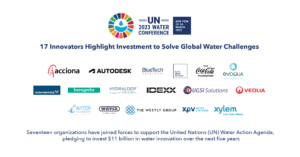Singapore Takes the Lead in Integrated Urban Solutions
Singapore is once again taking the lead to encourage governments and industry to come together to share and co-create solutions with an integrated approach to urban sustainability. They will converge at the World Cities Summit, Singapore International Water Week and CleanEnviro Summit Singapore that will be jointly held from 1 to 5 June 2014 at the Sands Expo & Convention Center at Marina Bay Sands, Singapore.
Leading integrated platform for urban sustainability
The World Cities Summit (WCS), Singapore International Water Week (SIWW) and CleanEnviro Summit Singapore (CESS) is the leading global platform for government and city leaders to discuss urban challenges and chart new directions and solutions for more liveable and sustainable cities of the future. Some 20,000 high-level delegates are expected to attend, including ministers, mayors, government and industry leaders, representatives of international organisations and academics. The involvement of key stakeholders across the spectrum of urban planning, water planning and waste management is critical, given the new and complex challenges facing cities.
According to the United Nations, over five billion people – or 60 per cent of the world’s population – will live in cities by 2030. To meet this exponential growth, about US$57 trillion in investment is required globally in infrastructure such as water resource management, solid waste management, transport, energy and telecommunications. This is nearly 60 per cent more than the US$36 trillion spent over the last 18 years. In addition, as resources become scarce, it is becoming increasingly apparent that a lack of regard for environmental sustainability could threaten long-term development.
The need for innovative and integrated urban solutions has always been imperative for Singapore. Given its small size and limited resources, Singapore has always adopted a forward-looking and integrated approach to urban planning and sustainable development to ensure a quality living environment for our people. Other cities are also adopting a more holistic approach to achieve sustainable growth - a key reason why mayors and government leaders from around the world are converging in Singapore in June to share ideas and solutions to tackle urban challenges effectively.
Integrated solutions for liveable and sustainable cities
Technology and innovation will also play a critical role to boost productivity in the infrastructure sector whilst governance will ensure that infrastructure deals are being structured for efficiency and effectiveness to meet the needs of residents. The events make it possible for the public and private sectors to engage in solutions-oriented dialogue that will attract investors, increase infrastructure investments, and promote beneficial partnerships to make cities liveable and sustainable.
Highlighting the need for an integrated approach to urban planning, Mr Khoo Teng Chye, Executive Director of the Centre for Liveable Cities said: “The interconnected nature of sustainable development calls for going beyond borders, both geographical and disciplinary, to coordinate strategies and make good decisions that benefit citizens. Problems are rarely contained within predefined jurisdictions such as one government agency or a single neighbourhood. This is a lesson that Singapore has learnt on its journey to urban sustainability. The World Cities Summit, Singapore International Water Week and CleanEnviro Summit Singapore demonstrate global thought leadership for a more holistic and sustainable approach to city planning.”
Representing the Singapore International Water Week, Mr Chew Men Leong, Chief Executive of PUB, Singapore’s National Water Agency, said, “With challenges such as extreme weather conditions threatening global water security, it is now more important than ever before for the world’s water ecosystem to pool resources and share best practices. Over the years, SIWW has established itself as a global platform for connecting the public sector with the private sector, water technology start-ups with potential investors, buyers with sellers, essentially to co-create water and enable solutions to meet these challenges.”
Mr Ronnie Tay, Chief Executive Officer of National Environmental Agency said, “As cities grow rapidly, business activity and consumption patterns drive up waste volumes. The World Bank has anticipated that by 2025, 4.3 billion urban residents will be generating about 1.42 kg/capita/day of municipal solid waste, making up an estimated total of 2.2 billion tonnes per year. Hence, many cities face the challenge
of building a clean and liveable environment, and acquiring sustainable environmental solutions. We hope CESS 2014 will be a useful platform for environmental leaders, policy makers and industry captains to come together to discuss these important challenges and possible solutions.”
Mr Ng Lang, Chief Executive Officer of the Urban Redevelopment Authority, co-organiser of WCS 2014 said, “The theme for World Cities Summit - ‘Common Challenges, Shared Solutions’ - reinforces the importance of collaboration between all stakeholders in urban development. With more than 100 mayors and 1,400 business leaders and industry experts expected to attend WCS, it is a leading platform for global leaders who shape cities to come together to address liveable and sustainable city challenges, share integrated urban solutions, and forge high-level partnerships.”
Source: PUB







